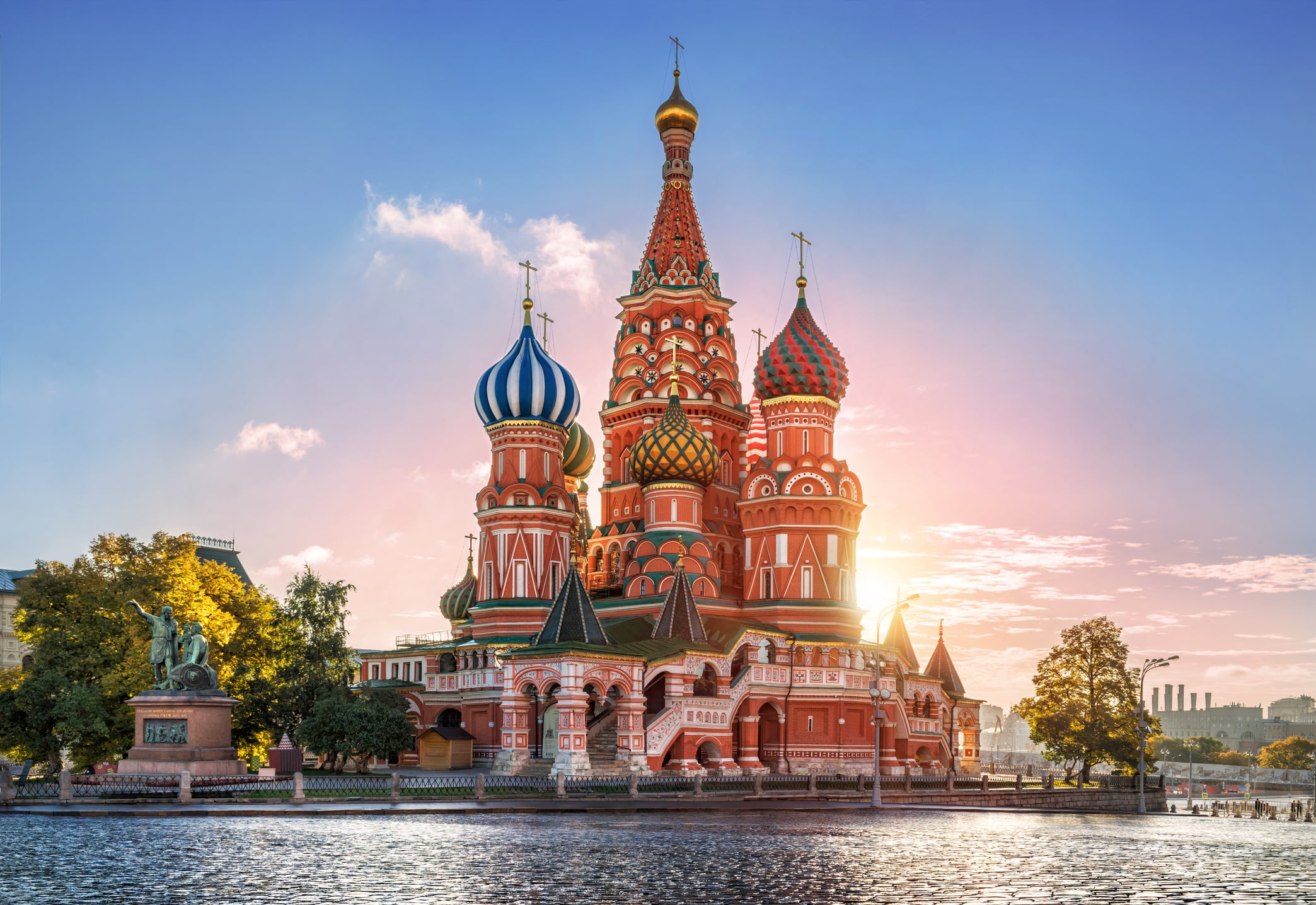
Whether preparing for a short visit or longer stay in Russia, it is best to know as much as you can about the country’s culture and social norms to increase your chances for a positive experience. Here is some general background on Russia, along with some specific tips regarding language, food and recreation preferences, and dining and interpersonal etiquette. The more you can assimilate the more memorable and stress-free your experience is likely to be. So, za vas!
A Little Background
Russia is the largest country in the world in terms of area (about 1.8 times the size of the USA) and has a population of more than 140 million people. It has a strong collectivist culture that dates back to medieval times when farmers lived and worked in self-managed agricultural communities known as mirs or obshchina. The country’s extreme physical conditions forced people to work together in order to survive.
Because of their difficult history, Russians tend to have a pessimistic outlook, although young people are less prone to this quality. Russians may say things such as “We will try to finish on time” or “Perhaps it will work” because they are aware conditions may change. Patience and flexibility are greatly valued and are extremely important.
Their complex and difficult history has led Russians to “hope for the best, but prepare for the worst.” It is common in Russia to respond honestly if someone asks, “How are you?” or “How it is going?” These questions are regarded as an invitation to discuss professional or personal issues. It is not the Russian tradition to answer with something like “I am great!” or “Everything is just perfect!”
Related to this is the key Russian concept of dusha, or soul, a concept that extends to the everyday. It refers to the Russian tendency to view and describe life through philosophical or spiritual terms. It is important to recognize this when interacting with Russians in business dealings.
Although ethnic Russians comprise 80% of the Russian Federation’s population, there are significant minority communities, with Tatars and Ukrainians comprising the largest minority groups. In all, there are more than 20 million people that belong to ethnic minority groups in Russia.
While the word “Russian” in English refers both to ethnic Russians and to citizens of Russia, the Russian language has two words, russki and rossijski, that denote an ethnic Russian and a citizen of the Russian Federation, respectively. It is important to understand that Russians have an intuitive understanding of the ethnic diversity of their country that is more difficult to represent in English.
The federal government has one official language countrywide – Russian – but more than 140 other languages and dialects are in use in the country, and many of them are official languages in their local provinces or oblasts.
Cuisine
Traditional Russian cuisine has more variety than you might expect. Typical Russian dishes include:
- olivier or stolichniy salad (a meat salad)
- Georgian lobio (spiced beans in sauce)
- blini topped with ikra (crepes with caviar)
- borshch (soup with beetroots)
- pelmeni (meat dumplings)
- pirozhki (filled pastries)
- smetana (sour cream) that accompanies many dishes
- from Azerbaijan and Uzbekistan, bakhlava dessert
Potatoes (cooked in many ways) are a very popular dish and a main garnish; Russians also are quite fond of ice cream (morozhenoe) and chocolate.
The traditional drink is black tea, usually served hot. Russians also serve kompot (a kind of berry juice mixed with water and sweetener), kisel (hot or cold juice thickened with cornstarch) and coffee.
Russians are famous for their hospitality, and a main feature of Russian hospitality includes offering numerous alcoholic drinks to the guest. Russia is well known for its vodka, of which there is a great variety. There are more than a dozen domestic Russian beers that may also be offered to guests, the most famous of which is Baltika.
If joining Russians for a meal at a restaurant, know that most meals begin with rounds of toasts and drinking. Learning to give a basic two-word toast (see below) will be well-received by hosts. Drinking without eating is considered impolite, and toasts are inevitably interspersed with salads, buterbrody (bread with butter and cheese or salami) and baked goods. Soup may be served next, and it is integral to Russia culture to eat bread along with the soup. The main course follows with meat, cooked vegetables, and other hot dishes. The dessert course often consists of pies, cookies, baked goods, ice cream and preserves.
Russians will generally assume a guest does not like the food if they eat little, so it is best to eat at a pace that ensures the ability to continue eating as more food is brought out. It is customary to refuse food three times before the host will cease to offer more, particularly when dining in someone’s home. Often, guests with food remaining on their plate will be offered more drink, and guests with drink remaining will be offered more food, so learning to end both food and drink at the right time is a skill worth acquiring. Always thank the host for the meal and compliment the chef.
Unfortunately, alcoholism is a problem in Russia, with a high number of deaths from alcohol poisoning and related maladies reported every year. Visitors should take care to avoid samogon (“moonshine” or self-distilled vodka), which can be dangerous. If you prefer not to drink, it is best to firmly, but politely, refuse from the start. This can be seen as an unforgivable cultural offense and is best approached from a health perspective. Many visitors choose to state that they suffer from ulcers in order to avoid drinking. The drinking culture is changing, however. Wine is becoming more common, and more and more of the younger generations are choosing not to drink, or to drink moderately.
Guests are treated as honored visitors, and can expect to receive numerous toasts at dinner; they also should be prepared to give a toast in return. Toasts tend to be long, rambling and sincere, and generally, include the phrases na zdorovye (“to your health”) and za vas (“to you”). Hosts will often prepare a wide variety of their best dishes, and it is important to be seen eating and enjoying the food.
Recreation
Russians are physically active and enjoy activities as varied as cross-country skiing, ice hockey, ice skating, football (soccer), tennis, hiking, mountain climbing, volleyball, swimming, and gymnastics. Some sports are generally popular away from the cities; e.g., sled racing is popular among the Yakuts of central Siberia, and archery is popular among the Buryats of eastern Siberia.
Russian athletes are among the best in the world and include many Olympic champions across various disciplines. Russia hosted the Winter Olympic Games in Sochi in 2014.
Chess is immensely popular in Russia, and the country has produced world champions. It is common to see outdoor public games of chess in the summertime. Russians engage in a wide variety of activities, from building models to language clubs to stamp collecting and video games.
In the summer, many Russians head off to their dachas, summer cottages located in the countryside. Usually, a dacha is a small plot of land with a very small, unheated house and a garden.
Communicating
- Russians tend to be reserved and frown upon loud speaking or laughter in public.
- Relationships develop slowly, so building rapport may take considerable time.
- The typical greeting includes a firm handshake and short, direct eye contact.
- Conversations between friends will include physical contact; personal space is close.
- Etiquette dictates that young greets old.
- Russian is the official language, and there are more than 140 minority languages.
- English skills vary; it’s more likely to find English-speakers in large cities.
Russian naming conventions
Russians generally have three names:
- a first (given name)
- a middle name (patronymic – the father’s first name with the suffix –ovich /-evich for a male or –ovna /-evna for a female)
- a surname (family name).
For example, in the name Ivan Ivanovich Nikitin, the first name is Ivan, the patronymic is Ivanovich (son of Ivan) and the surname is Nikitin. A woman often takes her husband’s surname.
In formal situations, in government companies, and in medicine and education, it is obligatory to use all three names. In many companies, people will use the first name and patronymic. However, it is becoming increasingly common for people to use only the first name and surname. Friends and close acquaintances may refer to each other by their first and middle names. Close friends and family members call each other by their first name only, and may choose to shorten the first name; e.g., Ivan will become “Vanya” and Alexander will become “Sasha.”
Just as in the matter of formality, it is best to err on the side of caution and use the first name and patronymic (middle) name when speaking to someone with whom you are not well acquainted. Courtesy titles are unnecessary if calling someone by their patronymic name.
Language Skills
Russian (russki) is the official language of the federation. It is an Eastern Slavic language written with the Cyrillic alphabet. About 80% of the population speaks Russian as a first and only language.
In addition, there are more than 140 minority languages and dialects spoken in Russia today, the most popular of which is Tartar, spoken by more than 3% of the population. Other minority languages include Ukrainian, Chuvash, Bashkir, Mordvin, and Chechen. Although most of these nationalities make up less than 1% of the population, these languages are prominent in key regional areas and may be an official language of the region or oblast. Most speakers of a minority language also speak Russian.
English language skills vary throughout Russia; businesspeople of the younger generation, especially in Moscow and St. Petersburg, are conversant in English and perhaps other European languages. Outside of the larger cities, it is rare to meet people fluent in English or in another language.
Vocabulary
Below are some helpful words and phrases in Russian.
| English | Russian | Pronunciation/Transliteration |
| Hello | Здравствуйте | zdrástvuyte |
| Goodbye | До свидания | do svidániya |
| Please | Пожалуйста | Pozháluista |
| Thank you | Спасибо | Spasíbo |
| I’m sorry | Извините | Izviníte |
| Excuse me | Простите | Prostíte |
| My name is… | Меня зовут … | menyá zovút … |
| Help | Помогите | Pomogíte |
| Do you speak English? | Вы говорите по-английски? | vy govoríte po anglíisky? |
| I don’t understand | Я не понимаю | ya ni panimAju |
A Few Extra Tips:
- Russians like to entertain in their homes. Bring a small gift to show your appreciation for the invitation.
- Remove your shoes when entering a Russian home. Hosts usually will offer a pair of slippers (tapochki).
- Russians, especially the older generation, will sometimes insist on giving away an object that has been favorably remarked upon. Refuse several times, but if you take the object, offer a gift later in return.
- Standing with your hands in your pockets is considered rude.
- Showing the soles of shoes is considered an insult. Cross your knees to avoid showing the soles of your shoes.
- Do not shake hands over a threshold, as Russian custom says that this will lead to an argument or bad luck.
- Do not clink glasses after a toast if the drink is non-alcoholic.
- When riding on public transport, always offer a seat to an elderly person or pregnant woman.
- Do not wear winter boots indoors.
- When in line (queuing), stand closely behind the person in front. Ask who is last in line, “kto posledny,” as sometimes lines are not in order.
- When going out, even to a casual restaurant, don’t wear sports clothes or overly casual dress.
- Do not step on manhole covers or grates – these are notorious for having ill-fitting or missing manhole covers.
- Do not refer to anyone as tovarisch (comrade).
Follow @goinglobal
Tweet to @goinglobal
Information on employment outlook for more countries can be found by logging into your GoinGlobal account!
Don’t have an account? Sign up for a free online demo to learn how you can utilize GoinGlobal’s employment resources.



